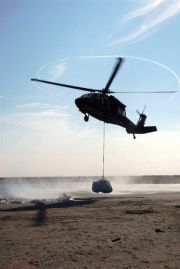BATON ROUGE, La., May 27, 2010 — “Launch, recover, launch” best describes the operations tempo of the helicopter missions being performed by the Louisiana Army National Guard’s State Aviation Command in its ongoing response to the oil spill along Louisiana’s coast caused by the April 20 explosion of the Deepwater Horizon oil rig in the Gulf of Mexico.
“Aviation’s being leaned on pretty heavily. … Just look at the flying hours,” said Army Col. Patrick R. Bossetta, commander of the State Aviation Command, located in Hammond, La. “We’re flying between 40 and 50 hours-a-day. I tell you, that’s a heck of a feat.”
Bossetta, from Folsom, La., explained that the operations tempo is almost as high as that experienced by Louisiana aviation units deployed to Iraq and Afghanistan in the past few years.
Maj. John P. Plunkett, commander of the Army Aviation Support Facility in Hammond, described the engineering support missions as primarily involving troop transport, sling-loading sand bags and critical engineering equipment, and aerial reconnaissance. The sling-loaded sand bags, often weighing up to 6,000 pounds per load, are dropped by UH-60 Black Hawk helicopters onto island breaches to stem the flow of oil into critical waters and marshes.
These same helicopters also transport soldiers and airmen to and from remote work sites, and carry the critical pieces of engineering equipment the troops need to perform their missions, such as fuel pallets and generators, Plunkett said.
The aerial reconnaissance missions are critical because they provide local authorities and emergency operations personnel the opportunity to see first-hand how the shoreline is being affected and how mitigation resources are being applied.
“It is critical that they can take a look at what’s going on in their parishes, how their booms are laid out, what defenses they have to protect themselves from any intrusion of oil and actually get eyes out on where the oil may be in their particular parishes,” Bossetta said.
Following pre-flight procedures that begin before dawn, the aviation missions launch from the Aviation Command’s headquarters in Hammond for work sites along Louisiana’s coastline. Once the day’s missions are completed, the aircraft return to Hammond, usually late in the evening, where the crew chiefs and maintenance technicians perform critical post-flight procedures, Plunkett said.
“They have to be mission-ready for the next day,” said Army Sgt. Robert Cuevas III, a crew chief and maintenance technician from Metairie, La., who works full-time at the State Aviation Command’s support facility.
“Basically the aircraft that fly one day are going to be flying the next day,” echoed Army Staff Sgt. Warren L. Smith, from Albany, La., who also works full-time as a crew chief and maintenance technician at the Hammond facility.
Despite the long workdays the aviation crews have been putting in, the aviators, crew chiefs and maintenance technicians have “good attitudes and are committed to doing the best they can to serve the state of Louisiana,” Plunkett said.
Speaking with pride about the soldiers in his command, Bossetta emphasized that “they always rise to the occasion – they always do.”
Source:
U.S. Department of Defense
Office of the Assistant Secretary of Defense (Public Affairs)

 von
von 
